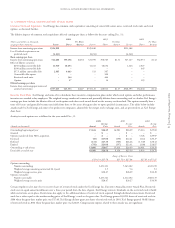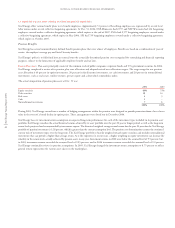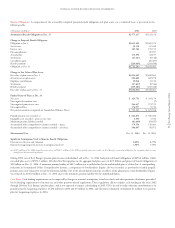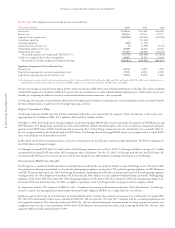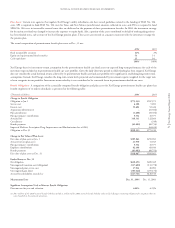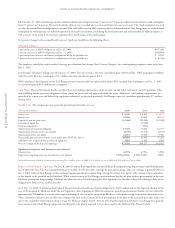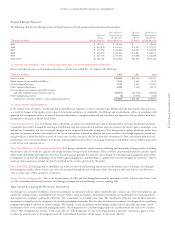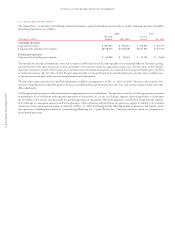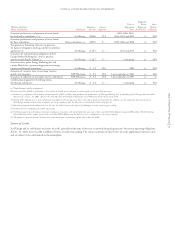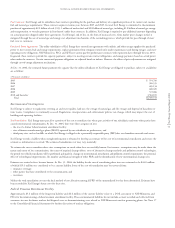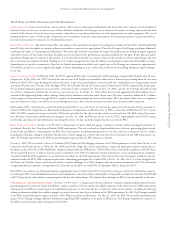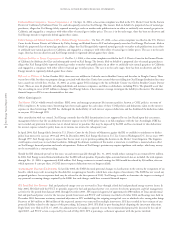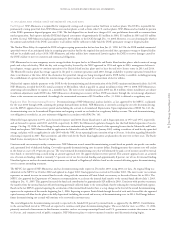Xcel Energy 2004 Annual Report Download - page 73
Download and view the complete annual report
Please find page 73 of the 2004 Xcel Energy annual report below. You can navigate through the pages in the report by either clicking on the pages listed below, or by using the keyword search tool below to find specific information within the annual report.
NOTES to CONSOLIDATED FINANCIAL STATEMENTS
Xcel Energy Annual Report 2004
71
The effective portion of the change in the fair value of a derivative instrument qualifying as a fair value hedge is offset against the change in the fair
value of the underlying asset, liability or firm commitment being hedged. That is, fair value hedge accounting allows the gains or losses of the derivative
instrument to offset, in the same period, the gains and losses of the hedged item. The ineffective portion of a derivative instrument’s change in fair
value is recognized in current earnings.
Interest Rate Fair Value Hedges Xcel Energy enters into interest rate swap instruments that effectively hedge the fair value of fixed-rate debt. The fair
market value of Xcel Energy’s interest rate swaps at Dec. 31, 2004, was a liability of approximately $8.3 million.
Hedges of Foreign Currency Exposure of a Net Investment in Foreign Operations
Due to the discontinuance of NRG and Xcel Energy International’s operations in 2003, as discussed in Notes 3 and 4 to the Consolidated Financial
Statements, Xcel Energy no longer has material foreign currency exposure.
Normal Purchases or Normal Sales Contracts
Xcel Energy’s utility subsidiaries enter into contracts for the purchase and sale of various commodities for use in their business operations. SFAS No. 133,
as amended, requires a company to evaluate these contracts to determine whether the contracts are derivatives. Certain contracts that literally meet the
definition of a derivative may be exempted from SFAS No. 133, as amended, as normal purchases or normal sales. Normal purchases and normal sales
are contracts that provide for the purchase or sale of something other than a financial instrument or derivative instrument that will be delivered in quantities
expected to be used or sold over a reasonable period in the normal course of business. In addition, normal purchases and normal sales contracts must have a
price based on an underlying that is clearly and closely related to the asset being purchased or sold. An underlying is a specified interest rate, security price,
commodity price, foreign exchange rate, index of prices or rates, or other variable, including the occurrence or nonoccurrence of a specified event, such as a
scheduled payment under a contract.
Contracts that meet the requirements of normal are documented and exempted from the accounting and reporting requirements of SFAS No. 133,
as amended. In June 2003, the Derivatives Implementation Group of the FASB issued Implementation Issue No. C20 (C20) to clarify the terms clearly
and closely related to normal purchases and sales contracts, as included in SFAS No. 133, as amended. Xcel Energy’s implementation of C20 in 2003
had no impact on earnings. However, certain contracts did require a one-time fair value adjustment as of Oct. 1, 2003. The result of this adjustment
was the creation of a derivative liability with an offsetting regulatory asset to reflect expected recovery of the amounts from customers. The derivative
liability and related regulatory asset will be amortized over the respective lives of the contracts. See Note 18 to the Consolidated Financial Statements.
Xcel Energy evaluates all of its contracts when such contracts are entered to determine if they are derivatives and, if so, if they qualify to meet the normal
designation requirements under SFAS No. 133, as amended. None of the contracts entered into within the commodity trading operations qualify for a
normal designation.
Normal purchases and normal sales contracts are accounted for as executory contracts as required under GAAP.
The following discussion briefly describes the use of derivative commodity and financial instruments at Xcel Energy and its subsidiaries, and discloses the
respective fair values at Dec. 31, 2004 and 2003.
Commodity Trading Instruments At Dec. 31, 2004 and 2003, the fair value of commodity trading contracts was $0.0 million and $4.2 million, respectively.
Regulated Commodity Instruments The fair value of qualifying cash flow hedges is presented as a component of Other Comprehensive Income in the
Consolidated Statements of Stockholders’ Equity. At Dec. 31, 2004 and 2003, the fair value of these contracts was $(24.6) million and $(11.2) million,
respectively.
Nonregulated Commodity Instruments Xcel Energy’s nonregulated operations use a combination of energy futures and forward contracts, along
with physical supply, to hedge market risks in the energy market. At Dec. 31, 2004 and 2003, the fair value of these contracts was $0.0 million and
$1.5 million, respectively.
The fair value of cash flow hedges related to nonregulated operations for 2003 is included in discontinued operations.
Financial Instruments Xcel Energy and its subsidiaries had interest rate swaps outstanding with a fair value that was a liability of approximately $30 million
at Dec. 31, 2004. On Dec. 31, 2003, subsidiaries of Xcel Energy had interest rate swaps outstanding with a fair value that was a liability of approximately
$18 million.


